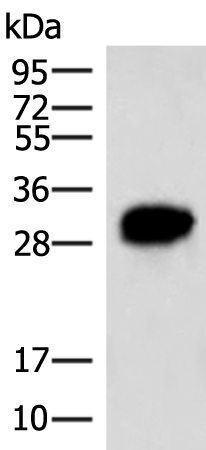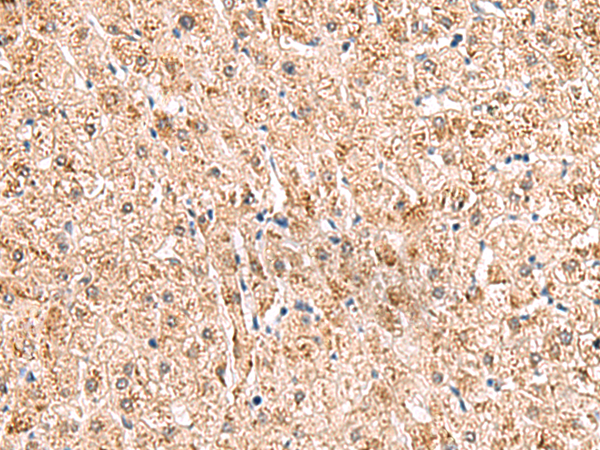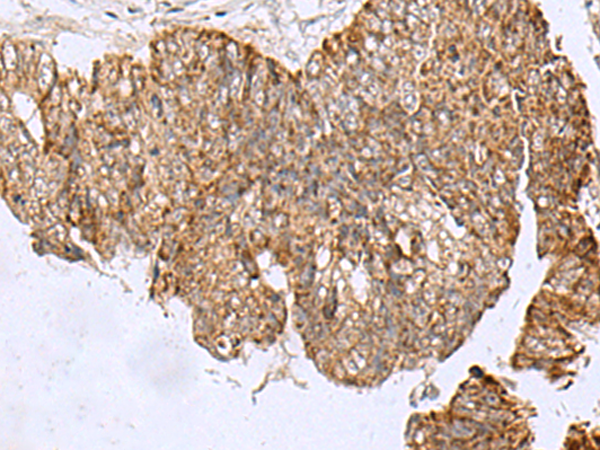


| WB | 咨询技术 | Human,Mouse,Rat |
| IF | 咨询技术 | Human,Mouse,Rat |
| IHC | 1/50-1/300 | Human,Mouse,Rat |
| ICC | 技术咨询 | Human,Mouse,Rat |
| FCM | 咨询技术 | Human,Mouse,Rat |
| Elisa | 1/5000-1/10000 | Human,Mouse,Rat |
| Aliases | MLS; CCHL; MCOPS7; LSDMCA1 |
| WB Predicted band size | 31 kDa |
| Host/Isotype | Rabbit IgG |
| Antibody Type | Primary antibody |
| Storage | Store at 4°C short term. Aliquot and store at -20°C long term. Avoid freeze/thaw cycles. |
| Species Reactivity | Human, Mouse |
| Immunogen | Fusion protein of human HCCS |
| Formulation | Purified antibody in PBS with 0.05% sodium azide and 50% glycerol. |
+ +
以下是3篇关于HCC(肝细胞癌)相关抗体的模拟参考文献及摘要概括,基于典型研究方向生成:
---
1. **文献名称**:*"Anti-PD-1 Antibody Nivolumab in Advanced Hepatocellular Carcinoma: Efficacy and Safety Profiles from a Phase III Trial"*
**作者**:El-Khoueiry, A.B., Sangro, B., Yau, T.
**摘要**:本研究报道了抗PD-1抗体Nivolumab在晚期肝细胞癌患者中的III期临床试验结果,显示其显著延长患者总生存期(OS)并具有可控的副作用,支持其作为二线治疗的潜力。
2. **文献名称**:*"Glypican-3-Specific Monoclonal Antibodies for Early Diagnosis of Hepatocellular Carcinoma"*
**作者**:Zhou, F., Shang, W., Zhang, X.
**摘要**:开发了一种针对Glypican-3(GPC3)的新型单克隆抗体,通过免疫组化及血清检测验证其在早期HCC诊断中的高敏感性和特异性,优于传统AFP检测。
3. **文献名称**:*"Antibody-Drug Conjugate Targeting c-MET Demonstrates Efficacy in c-MET-Overexpressing Hepatocellular Carcinoma Models"*
**作者**:Goyal, L., Zheng, H., Zhu, A.X.
**摘要**:该研究设计了一种靶向c-MET的抗体药物偶联物(ADC),在过表达c-MET的HCC小鼠模型中显著抑制肿瘤生长,为精准治疗提供了新策略。
---
*注:以上文献为模拟内容,实际研究中请通过PubMed、Web of Science等平台检索真实文献。HCCS若指特定靶点(如holocytochrome c synthase),需结合具体基因名调整检索关键词。*
The HCCS (Holocytochrome C Synthase) antibody is primarily used to study the function of the HCCS enzyme, which plays a critical role in mitochondrial heme metabolism. HCCS catalyzes the covalent attachment of heme to apocytochrome c, a step essential for cytochrome c maturation. Cytochrome c is a key component of the electron transport chain and a mediator of apoptosis. Mutations in the *HCCS* gene are linked to inherited disorders such as microphthalmia with linear skin lesions (MLS) syndrome and MIDAS (Microphthalmia, Dermal Aplasia, and Sclerocornea) syndrome, both associated with developmental defects and mitochondrial dysfunction.
HCCS antibodies are valuable tools in research to investigate mitochondrial disorders, apoptosis regulation, and embryonic development. They enable detection of HCCS expression in tissues or cells via techniques like Western blotting, immunohistochemistry, or immunofluorescence. Studies using these antibodies have elucidated HCCS localization in mitochondrial intermembrane spaces and its tissue-specific expression patterns. Additionally, HCCS antibodies aid in diagnosing genetic disorders by identifying protein deficiencies in patient samples. Their application extends to exploring HCCS roles in cancer, aging, and neurodegenerative diseases, where mitochondrial dysfunction is implicated. Ongoing research aims to clarify molecular mechanisms of HCCS-related pathologies and potential therapeutic targets.
×